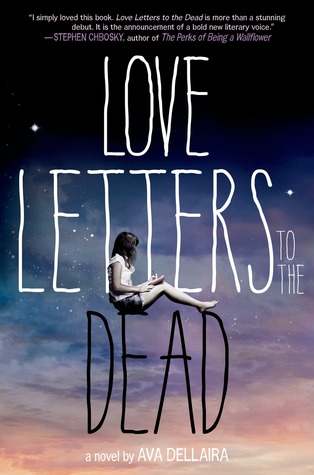Laurel's impetus for writing her letters comes from a high school English assignment at her new school: her teacher, Mrs. Buster, asks the class to write one letter to a dead person. Laurel completes the assignment - she addresses her first letter to Kurt Cobain - but she doesn't hand it in. The letters are too personal, and they get to the heart of what happened to her older sister May a few months before. She died, and Laurel was with her when it happened. Laurel's letters are specific to her relationship with May, to her experience at her new school (she started at a high school in her Aunt Amy's zone, so she wouldn't have to attend the same high school that May had), and her new friends and relationships. One of these relationships, and maybe the most important to Laurel, is with Sky, an older boy at school who has the Jordan Catalano vibe going on (many of the exchanges between the two read like a script from My So-Called Life, and so if you're missing that show, this might be the book for you). This book feels so much like a 1990s book (like Perks was), that I was thrown every time there was a contemporary reference, like to Amy Winehouse, or to The Dark Knight, and other pop culture in the last few years. It has the feel of something older, more nostalgic and plaid-covered.
Dellaira's writing shines throughout, especially her descriptions of Laurel's anxiety, depression, and uncertainty since her sister died. For example, Laurel describes, "My heart was about to spring out of my chest. I was trying hard to keep it in, because I didn't want it to land on the asphalt at her feet, next to the golden ring someone had dropped in the crack. And I really didn't want to cry" (200-201). Or when she is writing to Heath Ledger, and expressing how his death affected her:
I first got to know you from that movie 10 Things I Hate About You, and I always remember that scene where you jump up on the bleachers and sing "Can't Take My Eyes Off You" to the whole girls' soccer team to capture the heart of the girl you like. But after that, even though you got a lot of offers, you wouldn't do any more teen movies. Instead, you ate ramen noodles in your apartment and waited. You didn't just want to be famous, you wanted to be true to yourself. And eventually you got more roles, better ones, and you became the kind of grownup that made growing up seem okay, like you don't have to lose your spirit in order to get older. You became the kind of father that any daughter would have wanted to have. When they found you in your apartment, dead from too many pills, I really did think it was an accident. I don't think you meant to go. (210)Laurel weaves her own story of loss with that of celebrities and musicians: those who have lost, have been lost, and have become the loss in others' lives.
I'm usually a reader who always wants more at the end of a book, an extra chapter, an epilogue, or an afterword. But I found myself wishing that Love Letters to the Dead ended without an epilogue, and had stopped instead with the hopeful, if inconclusive, last words, "I know I wrote letters to people with no address on this earth. I know you are dead. But I hear you. I hear all of you. We were here. Our lives matter" (313). The epilogue undoes the careful work of the series of letters, and although Laurel carries with the theme (the epilogue is a letter to another dead person, her sister May), there was something simple yet heartbreaking in the anonymity of Laurel's letters, addressed to Jim Morrison and Judy Garland, that I didn't feel in the same way when May became the addressee. I liked the uncertain hope that Laurel ended with before the epilogue, the understanding that things would be different, but that she would keep on going and living and hoping regardless.





No comments:
Post a Comment